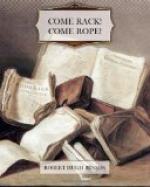“You have come on a fortunate day, mistress,” he said to Marjorie. “First Topcliffe, and now her Grace; if we make haste we may see her pass by.”
“Her Grace?”
“She will be going to dinner in Whitehall, after having taken the air by the river. They will be passing the Abbey now. But she will not be in her supreme state; I am sorry for that.”
* * * * *
As they rowed in quickly over the last hundred yards that lay between them and the stairs, Marjorie listened to the priest as he described something of what the “supreme state” signified. He spoke of the long lines of carriages, filled with the ladies and the infirm, preceded by the pikemen, and the gentlemen pensioners carrying wands, and the knights followed by the heralds. Behind these, he said, came the officers of State immediately before the Queen’s carriage, and after her the guards of her person.
“But this will be but a tame affair,” he said. “I wish you could have seen a Progress, with the arches and the speeches and the declamations, and the heathen gods and goddesses that reign round our Eliza, when she will go to Ashridge or Havering. I have heard it said—”
And then the prow of the boat, turned deftly at the last instant, grated along the lowest stair, and the waterman was out to steady his craft.
IV
It was the very crown and summit of new sensation that Marjorie attained as she stood in an open gallery that looked on to the road from Westminster to Whitehall. Father Campion, speaking of a “good friend” of his that had his lodgings there, led them by a short turning or two, that avoided the crowd, straight to the door of what appeared to Marjorie a mere warren of rooms, stairs and passages. A grave little man, with a pen behind his ear, ran out upon their knocking at one of these doors, and led them straight through, smiling and talking, out into this very gallery where they now stood; and then vanished again.
The gallery was such as those which Marjorie had noted on the way to the Tower; a high-hung, airy place, running the length of the house, contrived on the level of the second floor, with the first floor roof beneath and overhanging attics above. It was supported on massive oak beams, and protected from the street by a low balustrade of a height to lean the elbows upon it. It was on this balustrade that Marjorie leaned, looking down into the street.
To the left the narrow roadway curved off out of sight in the direction of Palace Yard; on the right she could make out, a hundred yards away, some kind of a gateway, that strode across the street, and gave access, she supposed, to the Palace. Opposite, the windows were filled with faces, and an enthusiastic loyalist was leaning, red-faced and vociferous, calling to a friend in the crowd beneath, from a gallery corresponding to that from which the girl was looking.




